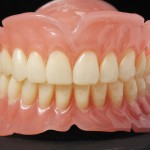
Oral health has improved in recent decades resulting in reduction in the number of patients with edentulism. However, an age and social gradient exists with higher level of edentulism in the elderly and socially disadvantaged. With an increasing in the elderly population edentulism is likely to remain a future restorative need. Complete dentures are the most common restorative approach and a range of recommendations regarding replacement have been made in the literature.
The main aim of this review was to assess the longevity of complete dentures and to review variations in longevity by denture type and duration of follow-up.
Methods
Searches were conducted in the Medline, Embase, CIHAHL, Dentistry and Oral Sciences Source, and the Cochrane library databases. Randomised control trials (RCTs), quasi-RCTs, controlled clinical trials, prospective or retrospective cohort studies, clinical observation studies, case-control studies, and cross-sectional studies published in English were considered. Screening and data abstraction was conducted by a single reviewer with a second reviewer assessing a 5% random sample to ensure consistency. Risk of Bias was assessed using the AXIS Risk of Bias tool (Downes et al) . Weighted mean longevity of complete dentures and weighted standard deviations were calculated, with sensitivity analysis based on risk of bias assessments performed. Pooled complete denture failure proportions were estimated by using random effects models.
Results
- 42 studies ( 22 cross-sectional ,22 cohort studies) were included.
- The mean age of included patients was 61.8 ±8.5 years.
- 24 studies were rated as having low risk of bias and 18 as very low.
- 58.2 % of the sample were female.
- 27 studies were used to calculate mean longevity.
- The weighted mean ±standard deviation longevity of maxillary complete dentures was 10.3 ±3.8 years, of mandibular dentures was 8.6 ±2.6 years, and of both maxillary and mandibular dentures was 10.8 ±4.7 years.
- The overall pooled failure proportion for complete dentures observed was 0.21 (95%CI; 0.15-0.28) [17 studies]
- The overall failure proportions for complete dentures observed for 2 years or less, 5 to 6 years, and 10 years or more were respectively
- 2 years or less = 05 (95%CI; 0.00 – 0.10) [3 studies].
- 5 to 6 years = 12 (95%CI; 0.08 – 0.16) [7 studies].
- 10 years or more = 41 (95%CI; 0.28 – 0.53) [8 studies].
Conclusions
The authors concluded: –
Complete dentures, fabricated primarily in university settings, were found to have a weighted mean ±standard deviation longevity of 10.1 ±4.0 years. The failure rate of these prostheses increased with denture age, and the longevity of maxillary dentures was greater than that of mandibular dentures
Comments
The authors have searched a range of databases although restricting their included studies to those published in English may have resulted in relevant studies being excluded. A majority of the included studies were cross-sectional and relied on patient memory to assess the age of existing dentures so recall bias may be a problem. However, failure proportions were calculated from studies which conducted longitudinal analysis of those receiving new dentures. The authors note that only one of the 42 studies was specifically designed to measure denture longevity and that most were provided in university clinics so may not be representative of primary care.
Links
Primary Paper
Taylor M, Masood M, Mnatzaganian G. Longevity of complete dentures: A systematic review and meta-analysis [published online ahead of print, 2020 Apr 28]. J Prosthet Dent. 2020;S0022-3913(20)30155-4. doi:10.1016/j.prosdent.2020.02.019
Other references
Downes MJ, Brennan ML, Williams HC, Dean RS. Development of a critical appraisal tool to assess the quality of cross-sectional studies (AXIS). BMJ Open 2016;6:e011458.
